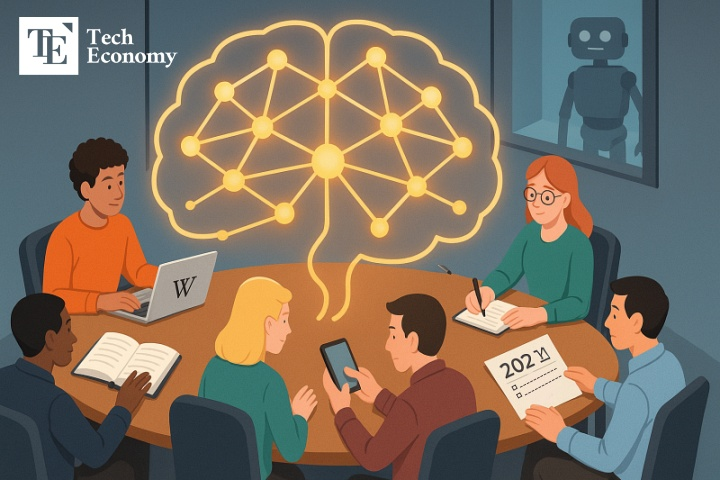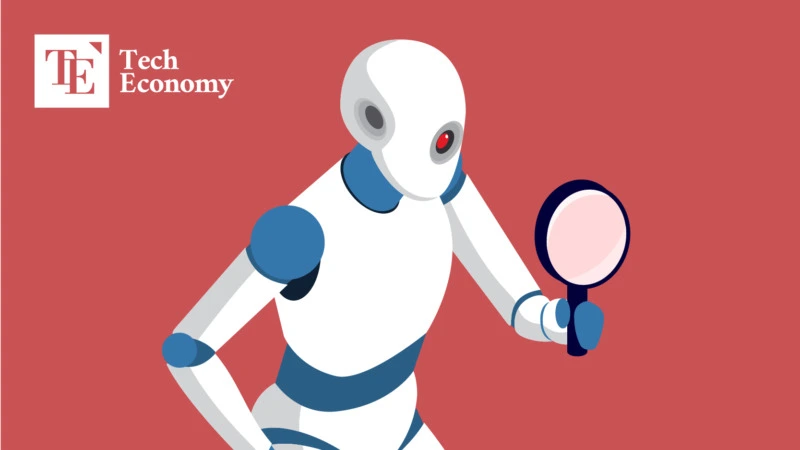“Questions Go to AI, Discussion Disappears” — Wikipedia Overshadowed by ChatGPT at a Turning Point in the Knowledge Ecosystem
Input
Modified
ChatGPT Nears 800 Million Monthly Visits AI Replacing Human-Centered Collaborative Structures Concerns Grow Over Decline in Critical Thinking

With the rise of generative AI technologies like ChatGPT, traditional knowledge platforms built on collective intelligence, such as Wikipedia and Naver Knowledge-iN, are rapidly being pushed aside. While AI's summary-based response format enhances user convenience, it is also weakening collaborative models that reflect diverse perspectives and contextual depth. As information consumption shifts from exploration and discussion to instant answers and passive acceptance, the knowledge ecosystem appears to be undergoing a fundamental transformation.
Sharp Decline in Traffic to Traditional Knowledge Platforms
As of June 11, industry sources report that, for the first time, ChatGPT’s monthly web traffic has surpassed that of Wikipedia. While figures vary slightly depending on the data provider, numerous global market research firms—including the UK-based GWI—have confirmed that as of April, ChatGPT overtook Wikipedia in terms of monthly visits. In the U.S. specifically, ChatGPT's monthly traffic has steadily risen since its launch, reaching 780 million visits in April. In contrast, Wikipedia’s traffic dropped to 716 million, marking the beginning of a clear downward trend.
Wikipedia isn't alone in facing a user exodus. South Korea’s once-dominant Q&A platform, Naver Knowledge-iN, is also experiencing a similar decline. Once a bustling hub of user-generated questions and answers, both new question volume and participation rates are falling. According to Naver, the total number of questions on the platform dropped from 24.59 million in 2022 to 15.48 million in 2023. The downward trend has continued into 2024, with monthly questions falling from 1.25 million in January to just 930,000 in April.
Experts point to this shift as a prime example of how traditional knowledge platforms have struggled to adapt to changing UX (user experience) expectations. Platforms designed around the reliability and diversity of information are now perceived by modern users as overly complex and time-consuming. Especially in mobile environments, the dominant user behavior favors quick, concise answers with minimal clicks, further weakening the relevance of traditional platforms. KAIST computer science professor Jooho Kim explained, “Unlike platforms, AI can grasp the intent behind a question,” adding, “It’s like turning on a tap and having knowledge flow instantly.”
Community-Based Knowledge Models Under Strain
The developer community site Stack Overflow is also seeing similar disruption. According to the platform, only 16,207 posts were made between May 1 and 26 of this year—a dramatic drop from its 2023 monthly average of 65,787 posts, representing a 75% decline. Founded in 2008, Stack Overflow earned a reputation as a sacred space for developers to share and refine practical coding knowledge through peer Q&A.
Platforms like Wikipedia, Naver Knowledge-iN, and Stack Overflow are all built on the foundation of collective intelligence. Knowledge is developed and refined through the contributions, corrections, and debates of a broad base of users, each sharing their expertise and experience. This model goes beyond mere information sharing—it's a process of collaborative knowledge construction with high intrinsic value.
But AI is rapidly replacing that model. Chatbots and AI-powered search assistants based on GPT models are trained on vast amounts of human-generated data and can deliver polished, structured answers instantly. Users no longer need to scan through countless documents or forum posts in search of the best response. A single question now yields a singular, high-confidence answer. In short, knowledge creation and dissemination are shifting from “many-to-many collaboration” to “one-model response.”

Diversity and Trust — What AI Is Still Missing
Some experts warn that recent changes in the way people access information could severely limit both the diversity of perspectives and the interpretive depth available to users. Platforms like Wikipedia and Naver Knowledge-iN, for example, often offer a variety of answers to the same question, reflecting different viewpoints and encouraging users to think critically and form their own judgments. In contrast, AI typically provides a single response to a query, often without adequately explaining the reasoning or perspective behind it.
This raises concerns about the reliability of information. Generative AI generates answers based on pre-trained data, but that process is not immune to errors or bias. Particularly with complex topics or fact-sensitive issues, AI responses can sound authoritative while still containing inaccurate or misleading content. Unlike Wikipedia, where errors can be corrected by multiple editors, or Knowledge-iN, where incorrect answers may be challenged by other users, AI lacks a comparable verification mechanism—making its “one-shot” responses relatively vulnerable to unchecked misinformation.
Another key limitation lies in AI’s inability to foster debate, which is one of the core strengths of collective intelligence. Traditional platforms allow for the collision of competing interpretations, where users actively engage, defend their positions, and expand their understanding. AI, on the other hand, eliminates this dynamic, instead offering what it calculates to be the most statistically probable answer. While convenient, this design may inadvertently weaken users’ capacity for critical thinking. Even in an age of instant answers, there remains a vital need for space dedicated to discussion, dissent, and multilayered interpretation.





















